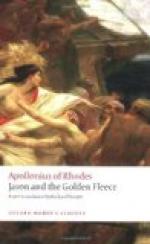of it, like the sap of a mountain-oak, she had gathered
in a Caspian shell to make the charm withal, when
she had first bathed in seven ever-flowing streams,
and had called seven times on Brimo, nurse of youth,
night-wandering Brimo, of the underworld, queen among
the dead,—in the gloom of night, clad in
dusky garments. And beneath, the dark earth shook
and bellowed when the Titanian root was cut; and the
son of Iapetus himself groaned, his soul distraught
with pain. And she brought the charm forth and
placed it in the fragrant band which engirdled her,
just beneath her bosom, divinely fair. And going
forth she mounted the swift chariot, and with her went
two handmaidens on each side. And she herself
took the reins and in her right hand the well-fashioned
whip, and drove through the city; and the rest, the
handmaids, laid their hands on the chariot behind and
ran along the broad highway; and they kilted up their
light robes above their white knees. And even
as by the mild waters of Parthenius, or after bathing
in the river Amnisus, Leto’s daughter stands
upon her golden chariot and courses over the hills
with her swift-footed roes, to greet from afar some
richly-steaming hecatomb; and with her come the nymphs
in attendance, gathering, some at the spring of Amnisus
itself, others by the glens and many-fountained peaks;
and round her whine and fawn the beasts cowering as
she moves along: thus they sped through the city;
and on both sides the people gave way shunning the
eyes of the royal maiden. But when she had left
the city’s well paved streets, and was approaching
the shrine as she drove over the plains, then she
alighted eagerly from the smooth-running chariot and
spake as follows among her maidens:
[Footnote 1: i.e. the liquid that flows
in the veins of gods.]
“Friends, verily have I sinned greatly and took
no heed not to go among the stranger-folk[1] who roam
over our land. The whole city is smitten with
dismay; wherefore no one of the women who formerly
gathered here day by day has now come hither.
But since we have come and no one else draws near,
come, let us satisfy our souls without stint with soothing
song, and when we have plucked the fair flowers amid
the tender grass, that very hour will we return.
And with many a gift shall ye reach home this very
day, if ye will gladden me with this desire of mine.
For Argus pleads with me, also Chalciope herself;
but this that ye hear from me keep silently in your
hearts, lest the tale reach my father’s ears.
As for yon stranger who took on him the task with
the oxen, they bid me receive his gifts and rescue
him from the deadly contest. And I approved their
counsel, and I have summoned him to come to my presence
apart from his comrades, so that we may divide the
gifts among ourselves if he bring them in his hands,
and in return may give him a baleful charm. But
when he comes, do ye stand aloof.”
[Footnote 1: Or, reading [Greek: menim],
“took no heed of the cause of wrath with the
stranger-folk”]




